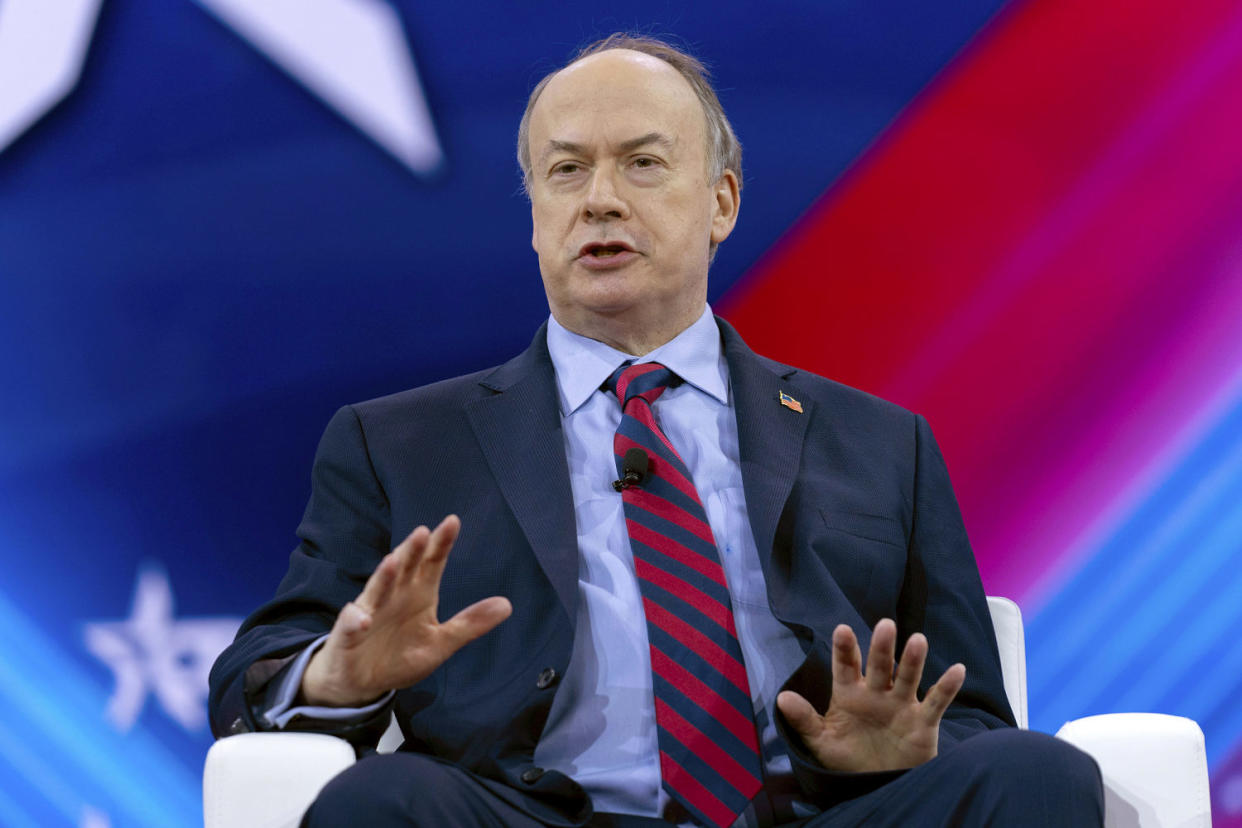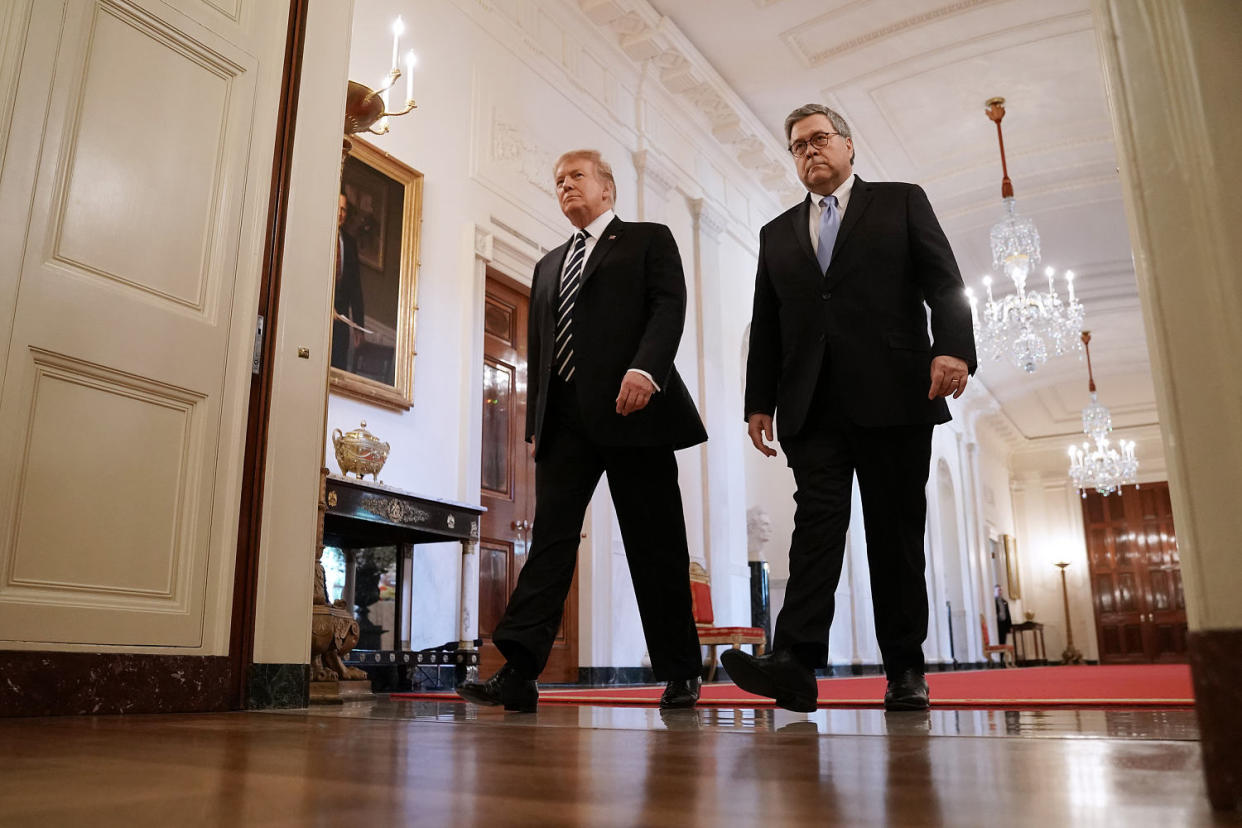Trump increasingly vows to prosecute political foes he says are 'corrupt' if he wins
Over the past two weeks, former President Donald Trump has become increasingly explicit in describing plans to use the Department of Justice to prosecute scores of people he has declared corrupt, if he wins in November.
Legal experts said Trump will face obstacles. Judges, prosecutors and juries, for example, could decline to try or convict people if there is scant evidence they committed a crime.
But the experts also said the Supreme Court’s recent immunity decision gives a president the power to order the attorney general to indict any individuals they wish without facing legal consequences themselves.
“Trump has enormous power if he really wants to do it,” said Stephen Gillers, a professor at New York University Law School. “There would be almost no stopping him from obtaining an indictment.”
Last Tuesday, Trump released a book in which he threatened to jail Mark Zuckerberg. Without citing evidence, he accused the Facebook founder of trying to sway the 2020 election and warned he would do so again in 2024.

“We are watching him closely, and if he does anything illegal this time he will spend the rest of his life in prison,” Trump said, “as will others who cheat in the 2024 Presidential Election.”
At a Saturday rally, Trump vowed to crack down on corruption in health agencies like the Food and Drug Administration and the Centers for Disease Control and Prevention, again without citing evidence.
In a social media post afterward, he threatened to carry out election fraud prosecutions against election clerks, campaign donors and others.
“WHEN I WIN, those people that CHEATED will be prosecuted to the fullest extent of the Law, which will include long term prison sentences,” Trump wrote. “Please beware that this legal exposure extends to Lawyers, Political Operatives, Donors, Illegal Voters, & Corrupt Election Officials."
Last month, after the Democratic National Convention, Trump reposted artificial intelligence-generated images of his enemies — including Joe Biden, Kamala Harris, Nancy Pelosi, Anthony Fauci and Bill Gates — in orange jumpsuits with the caption: “HOW TO ACTUALLY ‘FIX THE SYSTEM.’”
Trump has also reposted a photo of special counsel Jack Smith with the statement, “He should be prosecuted for election interference & prosecutorial misconduct.” And over the summer, Trump posted photos of former President Barack Obama and former Republican Rep. Liz Cheney with text calling for their prosecution at “public military tribunals.”
Flouting a 50-year-old norm
Since the Watergate scandal — which included a criminal conviction of President Richard Nixon’s former attorney general — the Justice Department has maintained a tradition of acting independently from the president when it comes to specific criminal investigations.
To prevent even the appearance of partisan influence over the department’s activities, the Justice Department makes its own decisions about individual criminal targets based on an elaborate set of rules.
The attorney general takes policy direction from the White House, but for the last 50 years, any effort by the White House to direct a specific criminal prosecution would have been seen as a scandal, under both Democratic and Republican presidents. This post-Watergate tradition, however, is nowhere enshrined in law.
There is no evidence Trump picked targets for criminal investigations during his first term as president, but he had to be talked out of firing Robert Mueller in an effort to thwart the special counsel’s investigation of his campaign’s interactions with Russians.
No law would prevent Trump from going much further in a second term, and some conservative lawyers associated with him have asserted that he could flex greater authority over his attorney general’s decision making in individual cases.

One of those lawyers is Jeffrey Clark, a former DOJ official who Trump sought to install as his acting attorney general in the weeks after the 2020 election in an effort to use the department to overturn his defeat. Clark currently helps run the Center for Renewing America, a Trump-aligned organization helmed by Russ Vought, a potential chief of staff to Trump in 2025.
Since leaving the Trump administration, Clark has argued that the attorney general should not be independent. “All of the executive power of the federal government is conferred on the President — including power over the Justice Department,” Clark wrote last year. “Officials subordinate to the President are vested with executive power only insofar as the President delegates such power to them.”
Another Trump legal ally, Mike Davis, a former aide to Sen. Chuck Grassley, R-Iowa, and to Supreme Court Justice Neil Gorsuch, has promoted the concept that a second Trump administration should rely on an acting attorney general, not a Senate-confirmed attorney general, to act on Trump’s wishes more efficiently.
Trump, during his first term, said, “As you know I like ‘acting.’ It gives you great flexibility.”
Davis has also said he would “rain hell on Washington, D.C.,” if he became attorney general and would “bring indictments” against President Joe Biden and members of his family, former President Barack Obama, Hillary Clinton and George Soros, a billionaire and major Democratic donor.
Davis told NBC News that he does not expect he would fill the role of acting attorney general but that another Trump ally could. He suggested that a second-term Trump DOJ could convene grand juries and seek indictments within weeks of taking office, noting that private citizens could be preparing possible referrals that the DOJ could use against people whom Trump supporters accused of waging "lawfare" against the former president.
“These lawfare Democrats should lawyer up and be prepared for accountability on Jan. 20 at 12:01 p.m.,” Davis said.
Davis said that the department could seek an indictment of anyone for whom “there is probable cause that they participated in a criminal conspiracy,” making the case that the department under Attorney General Merrick Garland’s tenure took a “very aggressive, broad view with their lawfare” against Trump, his allies and supporters, like those charged in the Jan. 6 attack on the Capitol.
“These partisan Democrat plaintiffs, prosecutors, outside lawyers, court witnesses, judges and other lawfare activists in Albany, Atlanta, D.C., New York City, Palm Beach, and Phoenix should all lawyer up,” Davis said. “At a minimum, they are fact witnesses — if not co-conspirators — in this blatant criminal conspiracy.”
Davis said the indictment could be brought in federal court in Fort Pierce, Florida, where Trump could potentially find a more favorable jury pool, and because that is near where the FBI executed a search of Trump’s Mar-a-Lago estate.
Stephen Richer, a Republican who oversees elections in Maricopa County, Arizona, said he worries that Justice Department officials in a second Trump administration would retaliate against local election officials who do not substantiate Trump's fraud claims.
“I think that we will see potentially, professionals who are more willing to bend general rules of prosecutorial ethics or legal standards who will occupy these positions,” Richer told NBC News.
He said that the first Trump term showed that the path to rising in a Trump administration is “to fully embrace whatever the marching orders are, even if they are contrary to law, contrary to ethics.”
Fear and chaos
Legal experts and current and former DOJ and FBI officials said that Trump’s threats appear to be part of an effort to pressure officials like secretaries of state who certify election results to back his claims.
A current law enforcement official who asked not to be named said the mere threat of prosecution will have a chilling effect that could cause officials to hesitate to challenge Trump’s claims of widespread fraud. They called it a form of intimidation.
Ilya Somin, a law professor at George Mason University, also said that Trump would likely have a mixed record in winning prosecutions. “Most line prosecutors would recoil” from prosecuting people with little evidence, he said.
Career FBI and DOJ officials would likely refuse to carry out a criminal investigation or prosecution if there isn’t probable cause, the senior law enforcement official said. The “Justice Manual” — the DOJ’s guidebook of rules and procedures — bars prosecutors and agents from carrying out unwarranted investigations.
But they cautioned that there’s a great deal of gray area and judgment involved in assessing evidence, particularly early in investigations. Partisan political officials could pressure career civil servants to carry out Trump’s orders. They could potentially fire people who refuse to conduct investigations.
Project 2025, a conservative group, has called for slashing the number of career DOJ and FBI officials and replacing them with political appointees who will carry out Trump’s wishes.
In the group’s playbook for a second Trump DOJ, Gene Hamilton, a former DOJ lawyer under Trump and current executive director of America First Legal, wrote that the new administration “must identify and address all individuals” who were a part of the system that sought to prosecute Trump over the past eight years.

Hamilton wrote that it must “dismantle” the “department corruption” as a means of “restoring the trust of the American people.”
Gillers, the NYU professor, said that Trump’s most powerful weapon is fear. While wealthy Americans like Zuckerberg could fight a wrongful prosecution for months, average citizens may just give up.
“What I see happening now is an attempt to control people Trump sees as in his way by scaring them,” Gillers said. “High-profile prosecutions can, like libel claims, terrorize those who don’t obey. He doesn’t have to win the prosecutions, only bring them.”






